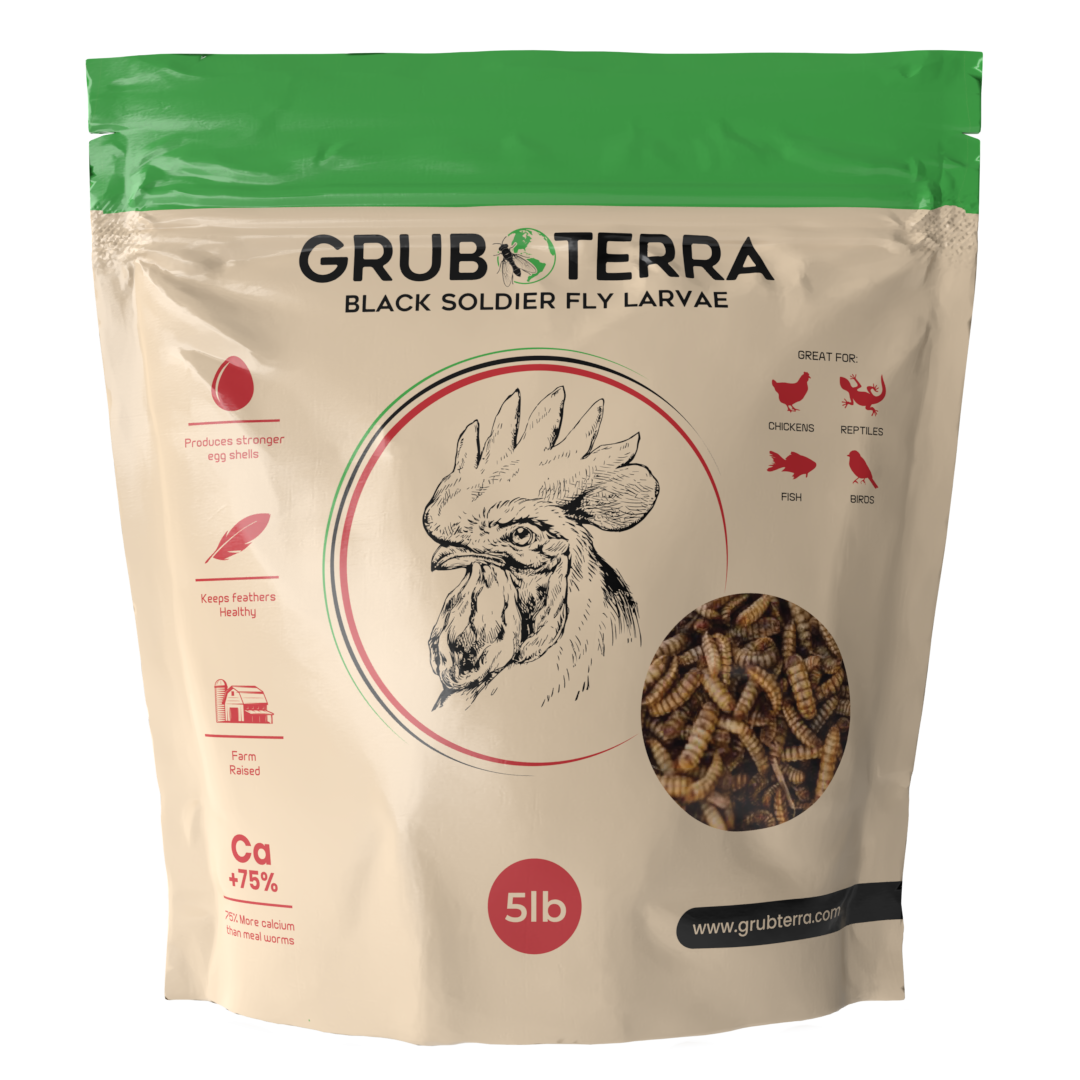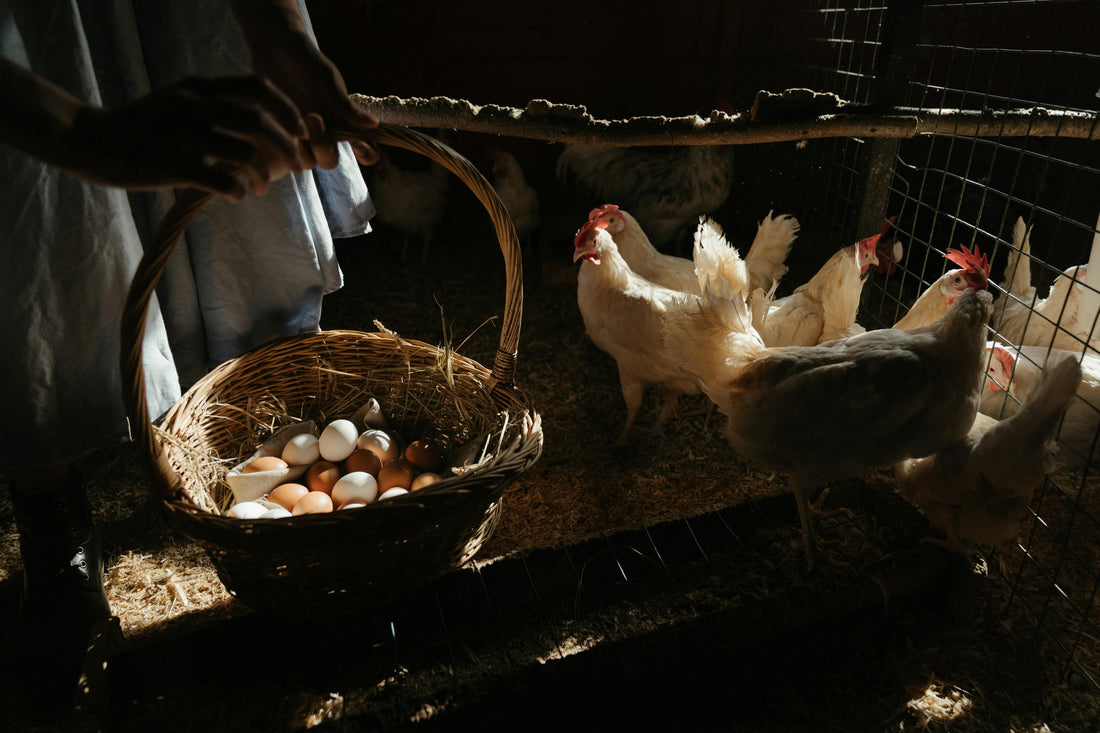The Importance of Daily Egg Collection

Collecting eggs daily is essential for several reasons. Fresh eggs are less prone to contamination and are easier to clean. Moreover, frequent collection minimizes the risks of eggs being broken or eaten by the chickens themselves.
- Signs of Freshness: Fresh eggs have a firm, rounded yolk and a thick, cloudy white. Collecting eggs daily ensures that you're getting the freshest eggs possible.
- Best Practices for Collection: Gentle handling is key. Use a basket or egg-collecting apron from GrubTerra to minimize the risk of breakage.
Cleaning Chicken Eggs

Cleaning eggs is a delicate process that, if done correctly, can significantly extend their shelf life and safety.
- The Dry Cleaning Method: Best for lightly soiled eggs. Use a fine-grit sandpaper or a dry cloth to gently remove dirt.
- The Wet Cleaning Method: Necessary for more heavily soiled eggs. Use warm water and a mild detergent, but ensure the water is warmer than the egg to prevent bacteria from being drawn into the pores of the eggshell.
- Do's and Don'ts of Egg Cleaning: Never soak eggs, as this can lead to bacteria penetration. Always dry eggs thoroughly before storage.
Storing Chicken Eggs
Proper storage is crucial for preserving the freshness and safety of your eggs.
- Refrigeration vs. Room Temperature: In many countries, refrigerating eggs is recommended to prevent the growth of salmonella. Store eggs pointed end down to keep the yolk centered.
- How to Organize Eggs for Storage: Use an egg tray or carton from GrubTerra to prevent eggs from absorbing strong odors and flavors in the fridge.
The Role of Diet in Egg Quality
What your chickens eat directly impacts the quality of their eggs. A balanced diet, rich in essential nutrients, will produce healthier, tastier eggs.
- The Impact of Nutrition: Chickens fed a varied, nutrient-rich diet lay eggs with stronger shells and richer yolks.
- Supplements: Black Soldier Fly Larvae: Introducing black soldier fly larvae from GrubTerra into your chickens' diet is an excellent way to boost their protein intake, leading to improved egg quality.
Ensuring the Health of Your Chickens

Healthy chickens are the foundation of a productive egg-laying operation. Regular health checks, a clean coop, and a balanced diet are key.
- Preventative Measures: Keep the coop clean and provide ample space for your chickens to reduce stress and prevent disease.
- Common Health Issues: Be aware of symptoms of common chicken diseases and how to address them. Consult a veterinarian if you notice any signs of illness.
Egg Collection Tools and Equipment
Having the right tools can make egg collection more efficient and less stressful for you and your chickens.
- Necessary Tools: Invest in a sturdy egg basket or apron from GrubTerra to safely transport eggs from coop to kitchen.
- DIY Solutions: For those on a budget, DIY egg baskets and collectors can be made from materials you may already have at home.
Advanced Egg Cleaning Techniques
For those looking to streamline their egg-cleaning process, advanced techniques and tools can help.
- Using Egg Washers: Egg washers can save time, especially for those with larger flocks. Make sure to use food-grade cleaners.
- Natural Cleaning Agents: For a more natural approach, consider using vinegar or lemon juice diluted in water as a gentle cleaning solution.
Troubleshooting Common Egg Collection Issues
Despite best efforts, you may encounter issues with egg collection. Here's how to troubleshoot common problems.
- Dirty Eggs: Increase coop cleanliness and provide nesting boxes with clean bedding to reduce the number of dirty eggs.
- Egg Eating by Chickens: Ensure your chickens are getting enough calcium and protein to discourage this behavior. Offering black soldier fly larvae from GrubTerra can help meet their nutritional needs.
- Preventing Breakage: Collect eggs frequently and provide soft nesting materials to minimize breakage risks.
The Science of Egg Storage
Understanding the science behind egg storage can help you make informed decisions about how to keep your eggs fresh.
- Understanding Egg Porosity: Eggshells are porous, allowing air and moisture to pass through. Proper storage helps maintain the egg's natural protective barrier.
- Temperature Fluctuations: Avoid storing eggs in the door of the refrigerator where temperature fluctuations are greatest. Instead, store them in the main body of the fridge.
Legal and Safety Considerations
If you plan to sell your eggs, it's important to be aware of the legal and safety considerations involved.
- Selling Your Eggs: Check local regulations regarding the sale of farm-fresh eggs. Many areas require eggs to be cleaned and stored properly before sale.
- Regulations to Consider: Labeling, egg grading, and proper refrigeration are common requirements. Visit GrubTerra's blog for more insights on navigating these regulations.
FAQs
What's the best way to clean chicken eggs?
Use the dry cleaning method for lightly soiled eggs and the wet cleaning method for more heavily soiled eggs, ensuring the water is warmer than the egg to prevent bacteria penetration.
How often should I collect eggs?
Collect eggs at least once a day to minimize the risk of breakage and contamination.
Can I store eggs at room temperature?
Depending on your country's guidelines, eggs may need to be refrigerated to prevent the growth of salmonella. Check local food safety regulations.
What diet enhances egg quality?
A balanced diet rich in proteins and minerals, supplemented with black soldier fly larvae from GrubTerra, can significantly enhance egg quality.
How can I prevent my chickens from eating their own eggs?
Ensure they have a nutritious diet high in calcium and protein. Supplements like black soldier fly larvae can also discourage this behavior.
Conclusion
Collecting, cleaning, and storing chicken eggs efficiently and safely requires knowledge and care. By following the best practices outlined in this guide, you can ensure that your eggs remain fresh, nutritious, and delicious for your family or customers. Remember, the health and diet of your chickens play a crucial role in the quality of their eggs. Incorporating supplements like black soldier fly larvae from GrubTerra into their diet can make a noticeable difference in eggshell strength and yolk richness. Visit GrubTerra for more tips on raising healthy chickens and producing quality eggs.
Whether you're a seasoned chicken keeper or just starting out, paying attention to the details of egg collection, cleaning, and storage can elevate your poultry-keeping experience. With the right knowledge and tools, you can enjoy the bounty of fresh eggs while ensuring the well-being of your flock.


